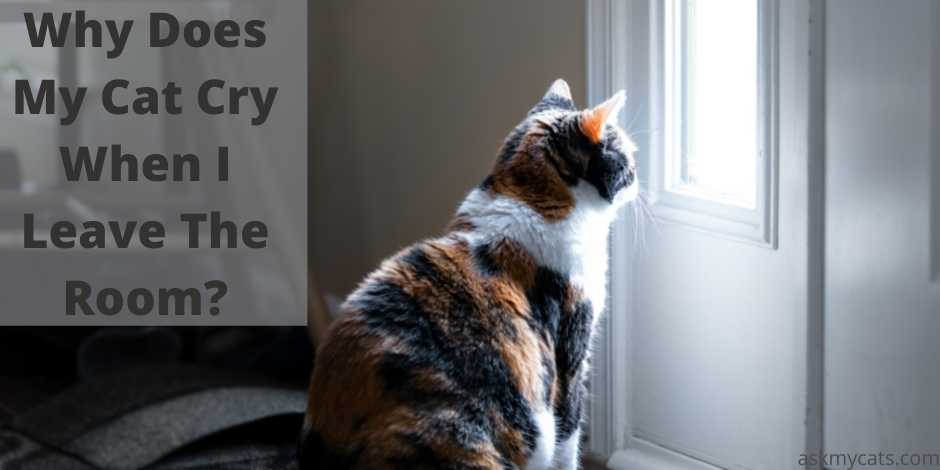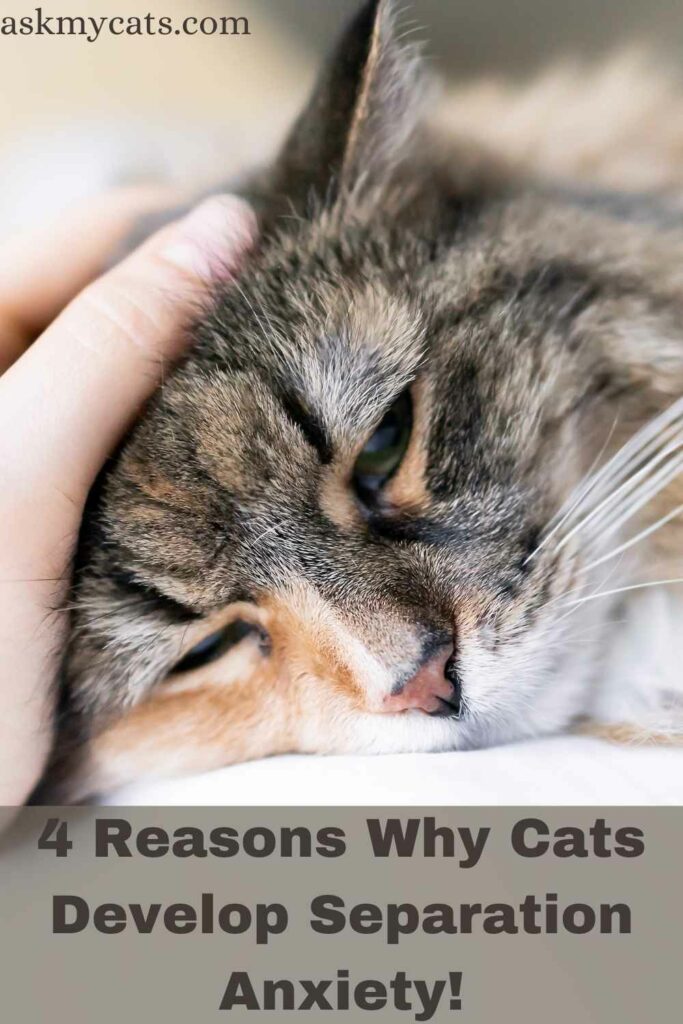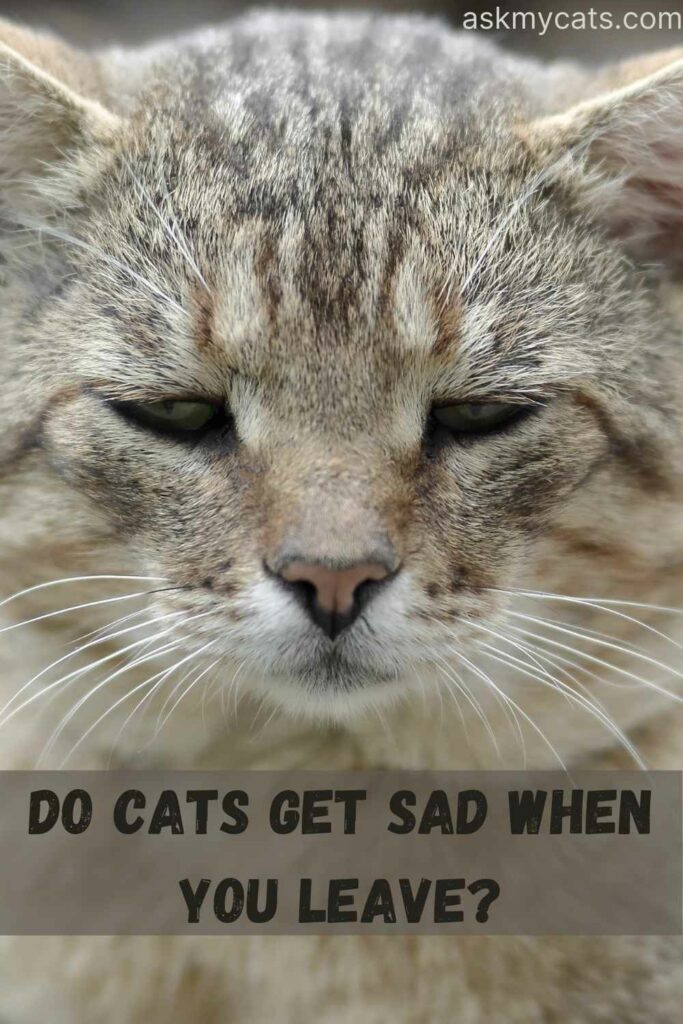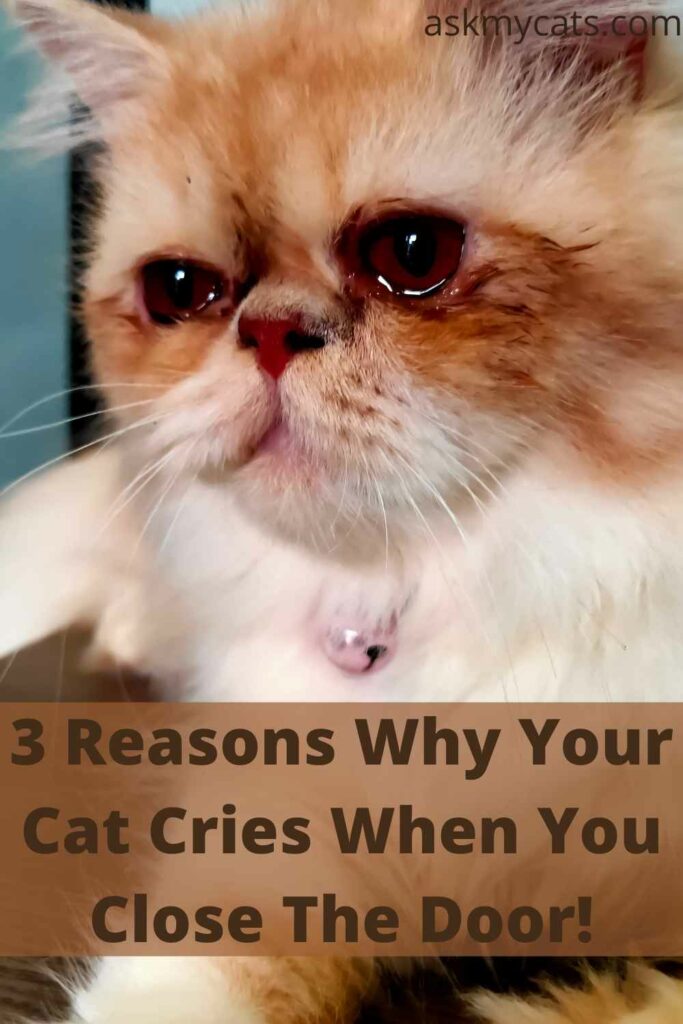It is generally believed that cats are not social animals. Still, contrary to this belief, many studies show that cats are indeed social creatures and could develop a relatively strong bond with their owner or favorite person.
So, the crying of your cat when you leave the room could be because of that strong bond between you and your cat, as your cat could become upset after seeing you go.
In this article, we will dive into the reasons why your cat cries after you leave the room and how you can fix this.


Give Your Cat the Perfect Day
Get the Free Ebook!
Why Does My Cat Meow When I Leave The Room?
Reasons behind your cat meowing after you leave the room could be that your cat is upset because you left or they are suffering from separation anxiety.
The most common reason behind your cat’s meowing after you leave the room is your cat being upset and wanting your attention as it has developed a strong bond with you.
As a result, the desire for wanting to stay with you is making them meow in hopes of your return.
However, in some cases, the meowing of the cat after the owner leaves the room is because the cat could be suffering from separation anxiety.
Here is a list of symptoms that can be used to identify if your cat is suffering from separation anxiety: –
- Vomiting food
- Extreme self-grooming
- Excessive vocalization like meowing, moaning, and crying
- Destructive behavior like scratching walls or furniture
- Animated greeting when you return
- Not eating until you return
- Aggressive behavior towards anyone who tries to approach them
4 Reasons Why Cats Develop Separation Anxiety!

1. Lack Of Socialization
Cats at shelters or rescues may go for long periods without seeing a human, which can have an impact on their personality.
Similarly, if a kitten was not touched frequently, it did not have many opportunities to develop confidence in humans.
When those cats are adopted and bond with their pet parents, they may show signs of sorrow when their human leaves the house for an extended amount of time.
Also, check out reasons behind i just adopted a cat and it won't stop meowing
2. Boredom Or Under Stimulated
A cat who relies on its owner for stimulation at home may struggle to separate.
When Cat is alone, they may become bored and lonely, causing them to become anxious.
Many behavior sessions have been conducted in areas where you wouldn’t expect to see a cat. A cat who lives in an environment with no cat trees and towers, no toys, and no window perches will have no joy.
3. Being Previously Orphaned
Separation troubles and exceptionally strong relationships with their humans are typical in cats who were orphaned as young kittens or weaned from their mothers far too soon.
Parting with their mothers at such a young age can lead to sentiments of abandonment that last a lifetime.
4. Having Health Issues
Rather than separation anxiety, your cat’s medical health could be the root of their behavior.
A trip to your veterinarian to rule out an illness or other physical cause for your cat’s behavior is an excellent place to start when trying to figure out why they’re acting the way they are.
Why Does My Cat Freak Out When I Leave The Room?
The reason behind the freak out of your cat when you leave the room could be a recent change in your routine, your cat having a very strong bond with you, or your cat suffering from separation anxiety.
Cats are typically fairly self-reliant. That’s why it’s hard to imagine a cat may suffer from separation anxiety. Cats, on the other hand, are social animals who create close bonds with their owners.
Most felines tend to despise change. Your cat may feel abandoned if there has been a recent change in your routine or work schedule.
Separation anxiety in cats is more difficult to detect than separation anxiety in dogs. While you’re gone, your cat won’t bark or utterly wreck the place as a dog might.
However, as you prepare to go, they may begin to meow excessively, get clingy, or go into hiding. A worried cat may also display fear signals, such as urinating or defecating outside the litter box.
All of these indicators could indicate that your pet is lonely, unhappy, or worried. Even so, it’s best to rule out medical conditions before jumping to conclusions.
Take your cat to the doctor for a check-up, and don’t forget to mention any physical symptoms, behavioral abnormalities, or changes in your daily routines at home.
Also, check out why do cats cry like babies
Do Cats Get Sad When You Leave?
Yes, cats tend to get sad when their favorite person leaves home as they are very deeply bonded to them and may feel sad when they leave, expressing their sadness through over-vocalization or destructive behavior.

When you leave a cat alone, some of them become sad, but not all of them do.
While many people think of cats as solitary animals, they thrive in groups and develop colonies of several cats on the streets.
They build complicated relationships with each other and with us, and they might get overly attached at times.
While you leave the house, or even when you’re in another room with the door shut, this can be challenging for them.
Even well-adapted cats may grow depressed and miss you if you leave for long periods of time, such as on vacation.
Cats are sociable animals; therefore, having two or more cats can be beneficial.
This way, they have someone to socialize with other than you, and they aren’t wholly reliant on you.
They can keep each other company while you’re away, play games with each other to stay active, and teach each other new things.
The latter is especially true at an early age when kittens are still learning and require the company of other kittens or cats in order to thrive.
There are, of course, exceptions to this rule. Some cats don’t get along with other cats or have contagious illnesses that make living with other cats impossible.
You’ll also want to make sure your kitties are appropriately introduced to avoid any potential conflicts.
3 Reasons Why Your Cat Cries When You Close The Door!
Reasons, why your cat cries when you close the door may include: They are curious, have a deep bond with you, and want to stay by your side or territorial wants.

Let us study these reasons in detail:
1. Being Curious
One of the most well-known cat sayings is “curiosity killed the cat,” and it has a lot of truth. Cats are usually curious about what is going on.
When they come upon a closed door, their interest is peaked, especially if they hear something on the other side!
They can’t help themselves; they have a strong want to know what’s going on inside, so the scratching and meowing begin!
2. Strong Bond
Cats are generally stereotyped as independent creatures who prefer to live alone, but this is not the case.
Cats, like humans, appreciate being in your presence and enjoy receiving attention or simply hanging out with you. As a result, they want to be a part of whatever you’re doing, or at the very least know what you’re up to.
If you’re hiding behind a locked door, they might not realize they’re missing out on a fun pastime with one of their favorite people.
3. Territorial Wants
Cats are highly territorial creatures and will rub their body to get their scent on things they consider to be theirs. If your cat is used to having free reign of your home, they will regard it as their territory.
They believe the residence to be theirs rather than yours. Closing a door restricts their access to all regions of their domain, something territorial species despise!
Also, check out Reasons Why Cat Keeps Meowing At Door!
Why Does My Cat Cry When She Can’t See Me?
The prime reason why your cat cries when she can’t see you could be because she is suffering from separation anxiety. Other causes could include Trying to communicate with you about that location, requesting food or drink, or showing boredom.
Cats often develop strong bonds with the person they like and often become sad when they can’t see them resulting in excessive vocalization through crying and meowing.
However, in some extreme cases, cats develop separation anxiety and become overly upset and anxious when left alone.
5 Ways You Can Get Your Cat To Stop Crying When You leave!
The five ways you can get your cat to stop crying when you leave are Other people’s contact, Anti-Anxiety medication, Cat TV, Routine change, and ensuring enough playtime.
Let us study them in detail:
1. Other People’s Contact
If your cat isn’t used to being around people other than you, they may develop a phobia of strangers. Allow a few pals to visit from time to time and give your cat a favorite treat or toy.
It may take a few tries for your cat to become brave enough to approach them, so be patient.
Getting them used to other people will make them less apprehensive in general and will make it easier for them to accept other carers while you are not available.
2. Anti-Anxiety Medications
In the most severe cases of separation anxiety, medication may be required as a last resort before your cat responds to the aforementioned measures.
If nothing you’ve tried so far has worked to calm them down, consult your veterinarian to figure out the best course of action for you and your cat.
3. Cat TV
Organize your cat’s environment so that they may have fun when they’re alone. Add a cat tree so they may sit up high and look out at their surroundings.
Treat balls filled with their favorite delicacies, as well as hiding treats throughout the house, will keep them occupied for hours. Bird feeders placed near your cat’s favorite window perch will also keep them entertained.
You might want to try acquiring them a friend if they are the only cat. They won’t even realize you’ve left!
4. Routine Change
When a cat with separation anxiety sees particular acts or items that indicate you are leaving, they feel anxious.
Pulling out your baggage to pack for a vacation or simply putting on your coat to go out to work and pulling out your keys might cause anxiety in some felines.
When they see these objects, they know you’re about to leave the house. The answer is to accustom your cat to these things so that they become commonplace rather than indicators of imminent alone time.
When you aren’t traveling, try leaving your suitcase out. Pull your keys out a few times a day, but don’t leave the house. Allow your jacket to sit outside for a few days.
These cues will soon lose their potency, and your cat will no longer be as concerned when they see them.
When you do leave the house, make a point of distracting your cat with cat treats or a toy before discreetly slipping out the door and saying your goodbyes.
5. Enough Playtime
Playing with your cat two or three times a day is the easiest thing to do. Include a variety of toys in your play sessions to fulfill your cat’s predatory drive.
Encourage your cat to play alone when they begin to do so. To make the behavior stick, use patting, incentives, and praise. Do not encourage clinging behavior, meowing, or any other undesirable behavior.
Frequently Asked Questions
Should I use puzzle toys to help my cat cope with me leaving?
Ans. Yes, you can use puzzle toys to help your cat cope with your leaving as they will provide a stimulus for them, keeping them busy and draining their pent-up energy.
How to determine if my cat is suffering from separation anxiety?
Ans. The best way to determine if your cat is suffering from separation anxiety or not is to install cameras at your home and observe their behavior as you leave home.
Should I consult a vet for my cat as he is crying whenever he can’t see me?
Ans. Consulting a vet for your cat because of his crying whenever you leave home is a good idea, as your vet could diagnose your cat and treat her if there is an underlying medical condition.
Final Words
Watching your cat cry is an unbearable sight that no one wants to see. However, fortunately, you can make your cat adapt to your leaving by using the aforementioned methods.
All you need is some patience and a whole lot of love and attention that you need to give to your feline companion.
For any others questions and queries, feel free to ask us in the comment section.
